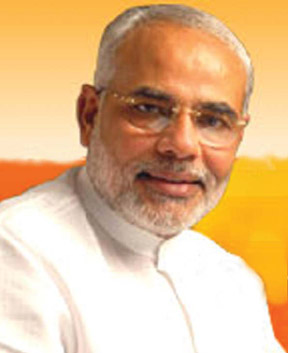Gujarat Chief MInister Narendra Modi Biography

Narendra Modi is a vibrant chief minister of the Indian State of Gujrat.
The first slogan that he coined to capture the voters imagination was “Apnu Gujarat, Agavun Gujarat or Our Gujarat, Unique Gujarat”.
Since 7th October 2001 has been the chief minister of the Indian state of Gujrat. Narendra Modi was promoted to the office following the defeat of the BJP in the elections.
In December 2002, Narendra Modi won re – election as chief minister with 126 seats in the 182 – member assembly. In the early 1990′s, as elections organiser he participated in the rise to political dominance of the Bharatiya Janata Party in Gujarat.
Mr Narendra Modi was born on 17th September 1950, to a middle class family in the Mehsana district of Gujarat. During his student life, Narendra Modi displayed influential leadership qualities, and this was clearly seen when Narendra Modi successfully set up a new chapter of Akhil Bharatiya Vidyarthi Parishad, at that time it was a powerful national student body.
This post – graduate in political entered social life right at the beginning of his
in the early seventies. Narendra Modi joined the Rashtriya Swayamsevak Sangh as a young man in the year 1974.
After that he became a full – time worker and organiser for it. During his engagement with RSS, Narendra Modi plunged into the anti – corruption movement. In the early 1980s, Narendra Modi joined the Bharatiya Janata Party. Narendra Modi was the brigde between the RSS and the BJP.
Modi was recognized as the master planner between 1988 and 1995, who had successfully carried out the necessary groundwork for making BJP the ruling party of the state.
The responsibility of organizing two crucial national events were entrusted to Narendra Modi during this period – the Somnath to Ayodhya Rath Yatra (a very long march) of Mr Advani and a similar march from Kanyakumari (the southern most part of India) to the troubled Kashmir in north.
To note a statement of Lal Krishna Advani, a senior leader of the Bharatiya Janata Party about Modi “a leader who, after being subjected to a malicious and prolonged campaign of vilification, has been able to impress even his critics with his determination, single – minded focus, integrity and a wide array of achievements in a relatively short time”.
In the beginning, Narendra Modi was believed to be a back – room operator for the political party. Narendra Modi was made the National Secretary of the party in the year 1995, in charge of five major states in India.
Narendra Modi was asked to head the government of Gujrat in the turmoil period (2001) of Gujrat, as the state was undergoing problems because of several natural calamities including the massive Gujarat Earthquake in January 2001.
In order to compensate for economic losses, Modi re – organised the government’s administrative structure. It was during his headship Gujarat registered the highest growth rate among all the states in India with a GDP growth rate of over 10%.
Narendra Modi was credited by the Gujrat Government for reducing the fiscal deficiency of the state treasury by fifty percent and reducing the losses of the Gujarat State Electricity Board. It is his initiative with which the availability of electricity in many parts of rural Gujarat was increased in over 5,000 villages.
Successful raising of the height of the Narmada Dam from 95 to 110.64 metres is one of the most substantial accomplishments of his government that has been resulted in increased irrigation, water supplies and hydroelectric power.
The increased height has resulted in waters finally flowing to practically all parts of the state. Several drinking water schemes, in addition, have been accomplished and the problem of water scarcity is nearly on its way to extermination.
By over one hundred per cent, value of the agricultural production of Gujarat has grown during the first three years of the Narendra Modi’s government.
Narendra Modi is considered to be one of the most easily reachable political leaders in India. Narendra Modi is popular and progressive, tech – savvy and a true democrat, a poet and author of three books.
For the 500,000 government employees in Gujarat, Modi has launched a motivated training programme. Narendra Modi is a leader who believes in teamwork. This initiative of him is being watched in admiration by every other state and is in for replication through out the nation.
A true Karmayogi (doer), as Narendra Modi has been named Mr Modi refuses to be intimidated by catastrophes and turmoil and is effectively leading Gujrat to be one of the top states of India.
His trail – blasting efforts have afforded rich dividends for of the state.
Narendra Modi has been awarded by ‘India Today’ as the best chief minister twice in three years. Modi is considered front – runner in party’s leadership among the next generation of politicians.
A section of society calls him “Chhotte Sardar” the next Sardar Patel who is most distinguished politician from Gujarat – State who is the architect of India with immeccable contribution to India’s freedom movement.
Narendra Modi is widely esteemed as a youthful and vigorous leader with innovative thoughts. Modi has communicated his vision successfully to the people of Gujarat and has been able to impart faith, trust and hope among the 50 million people of Gujarat.
Image of the state as a preferred investment destination with the successful conclusion of the Vibrant Gujarat Summit in January 2005, among global investors has taken a quantum leap.
Mr Narendra Modi is adored as an able and visionary leader, wide cross section of the people of Gujarat, cutting across religions, income groups and even political affiliations.
Narendra Modi is also admired as one who is successfully, significantly, extensively, transparently and persuasively uplifting the quality of their lives. A skilled narrator and an adroit negotiator, Mr Narendra Modi has earned the love and affection of people from villages and cities.





